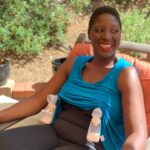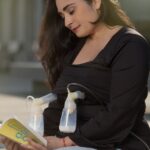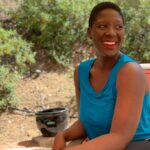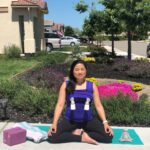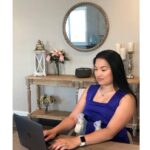Fourth Trimester Podcast Episode 82: Hands-Free Pumping
On Episode 82 we talk about the real experience of the first few months with a new baby, and how having children can change the perspective of someone providing professional medical care for families. Sometimes, experiencing parenthood inspires invention, and this was certainly the case for Calisha Cobb, the founder and patented inventor of HANDY (Hands-Free Pumping Bra Tops).
As a Pediatric Nurse Practitioner and Mother of two breastfed daughters, Calisha experienced the challenges of breastfeeding when she returned back to work, and shortly thereafter, as the result of common challenges that working breastfeeding Mothers face, the HANDY Top was invented! Her goal is to assist all Moms in achieving their breastfeeding goals.
Comfort and style can’t always coexist and when it comes to attire appropriate for breastfeeding moms, there’s a lot left to be desired.
Calisha Cobb has applied herself to the problem and come up with wearable, functional and great looking tops for moms who need to be able to breastfeed and/or pump milk while getting life done! We were so blessed to get a chance to chat with her about life and her HANDY BRA TOPS. Please check out her offerings!
“Hands-free. pumping allows you to not have to pause life in order to pump, because I think that that is one of the biggest mental challenges with pumping — just having to take that time out of your day to sit and pump.”
— Calisha Cobb

Selected links
Connect with Calisha Cobb Handy Bra Tops Website | Handy on Instagram | Handy on Facebook
Learn more Learn All About Breastfeeding | Top 3 Episodes of the Fourth Trimester Podcast – Start here!
Connect with Fourth Trimester Facebook | Instagram | esthergallagher.com | About & Contact
Episode Transcript
Sarah Trott: [00:00:05] My name is Sarah Trott. I’m a new mama to a baby girl and this podcast is all about postpartum care for the few months following birth, the time period also known as the Fourth Trimester. My postpartum doula, Esther Gallagher, is my co-host. She’s a mother, grandmother, perinatal educator, birth and postpartum care provider. I’ve benefited hugely from her support. All parents can benefit from the wisdom and support that a postpartum Doula provides. Fourth trimester care is about the practical, emotional and social support parents and baby require, and importantly, helps set the tone for the lifelong journey of parenting.
When I first became pregnant, I had never heard of postpartum Doulas, let alone knew what they did. So much of the training and preparation that expecting parents do is focused on the birth and newborn care. Once a baby is born, often the first interaction parents have with medical or child professionals, other than the first pediatrician visits, is the six-week checkup with the OB/GYN. What about caring for mama and family between the birth and the six week doctor visit? What are the strategies for taking care of the partner and the rest of the family while looking after your newborn?
Our podcasts contain expert interviews with specialists from many fields to cover topics including postpartum doula practices, prenatal care, prenatal and postnatal yoga, parenting, breastfeeding, physical recovery from birth, nutrition, newborn care, midwifery, negotiating family visitation, and many more.
First-hand experience is shared through lots of stories from both new and seasoned parents. Hear what other parents are asking and what they have done in their own lives.
We reference other podcasts, internet resources and real-life experts who can help you on your own parenting journey. Visit us at http://fourthtrimesterpodcast.com
[00:01:16] So I’m really excited today to talk about our topic. Calisha Cobb is the founder and patented inventor of Handy, which is a hands free pumping bra top. As a pediatric nurse practitioner and mother of two breastfed daughters, she experienced the challenges of breastfeeding when she returned back to work and shortly thereafter and the handy bra top was invented. Her rea. I want one of these so bad. Her goal is to assist all moms in achieving their breastfeeding goals. And who better than someone who has been working with parents day in and day out for her career? So that’s fantastic. Calisha, welcome to the show.
Calisha Cobb: [00:01:56] Thank you. Thank you for having me.
Sarah Trott: [00:01:57] Yeah. We’re so honored to have you. So do you want to introduce yourself a little bit in your own words?
Calisha Cobb: [00:02:02] Sure. So I am Sarah. I’m Keisha Cobb and I am a wife and a mother of three beautiful daughters, and I am a pediatric nurse practitioner who actually went to I trained at Johns Hopkins University, and I’ve been working for just under 15 years, 11 years in primary care with parents just as yourselves and about four years in inpatient. I worked at Children’s Hospital in Oakland. My journey also has led me to handy, as you also mentioned, and I am the patented inventor and owner of Handy, which is, like you said, a hands free pumping bra top that allows moms to multitask, but even more importantly, to pump any time in anywhere because our tops offer a covering over your midsection which allows you to pump in public as well as in private.
Sarah Trott: [00:02:59] Well, I just think it’s fantastic that you saw a need through your work and then also through your own experience of going through motherhood and breastfeeding. It’s not just about the technicalities when it comes to pumping milk. I think anyone who’s familiar with it knows that there’s just like anything you can do to make it more enjoyable or a more comfortable experience is welcome. Very welcome.
Calisha Cobb: [00:03:21] Yes.
Esther Gallagher: [00:03:21] And a more immediate experience, because you never know when you’re getting where you’re going to be, when you might have to pump.
Calisha Cobb: [00:03:28] That’s absolutely true. And listening to just moms over the years. So my journey with Handy actually started about 12 years ago with my biological oldest and just facing the challenges that a lot of moms face with returning back to work and having that responsibility of pumping and wanting to still provide breastmilk to my child in spite of the work obstacle that we face. And so having said that, that’s how Handy actually came up, is because I was like, I’m trying to chart as a nurse and I’m trying to make phone calls as to my parents who have questions about their little ones. And I’m like, But I need to pump. And I’m like, My hands are not free. So it came it literally was birth that way and just years of prototyping it and of course, getting it patented and just really trying to make it something that truly assists the mom and her breastfeeding journey was what our goal was.
Esther Gallagher: [00:04:35] Carlesha, I, I want to say about your product, which I think is, I mean, not only is it practical, but looking at photos of the the different styles that you’ve had. They’re beautiful.
Calisha Cobb: [00:04:52] Thank you.
Esther Gallagher: [00:04:52] You know, I mean, and one of the things I particularly love and I just want to describe for our listeners, because we’ll put out some some photos on our website and things like that. But you had the love in you, I guess I’d say, to feature women of color and different shapes and sizes. They’re beautiful pictures that depict I’m just going to say, real women.
Calisha Cobb: [00:05:20] Yes.
Esther Gallagher: [00:05:21] Doing real things. Right, like whether they’re housekeepers or nurses or whatever they’re doing, going out for a jog. And and and so I was I was really pleased getting to see your website and and all of that. And so. So I wanted to describe, like, not only are they beautiful, but they’re also, I think, very discreet. And I’m somebody who has no problem with bare boobs. Like, you know, as far as I’m concerned, we should be able to whip them out wherever we are, whenever we want. But we don’t live in a culture where that is safe and and comfortable for all women everywhere. In fact, pretty much no women anywhere. Let’s let’s be real about it. And besides the fact that one who’s watching would see that there are pump attachments, they are quite discreet as well as lovely. So I just wanted to give our listeners that, that Birdseye view of your, of your wonderful bra tops. But let’s circle around and would you mind telling us a little bit about your your birth and postpartum and maybe also, of course, that transition back to work as a nurse practitioner?
Calisha Cobb: [00:06:42] Yes. Thank you for the compliments on the tops. And they do fit quite a few. They fit all sizes now, which is what we’re really, really proud of. They’re customizable, so they’re able to fit most, if not all, moms now, which we’re super excited about. But as with regard to my own birth experiences, I almost wish my husband was right here because he’d be laughing with me. So the first one, the 12 year old, she was a 17 hour labor and was, you know, pretty straightforward. The second one, I didn’t even know I was in labor and she came and probably about 45 minutes. So it was just this total different experience, as I’m sure most parents have a variety of birthing experiences and of just like your birthing experience, your children are totally different to and so they’re both different postpartum wise. I experience with our first one, I didn’t know this and she was not gaining weight and come to find out she was actually tongue tied and we didn’t know that until it was already well into the time when she should be moving forward in her weight gain. And we figured that out. So we tackled that situation. But the other thing is, is that as a new breastfeeding mother, even though I had been speaking to so many moms about this on a daily basis, when you have your own, it’s so different.
Calisha Cobb: [00:08:16] And so I realized that she was actually snacking more than truly getting full with her breast with the breastfeeding sessions. So I was wondering why I was feeding her. I was nursing her every like 30 to 45 minutes. It’s like, gosh, is she really growing this much? But it was really because she was falling asleep at the breast. And I just really felt very overwhelmed, very consumed with breastfeeding. And I just didn’t feel like I could establish a routine. Like, I mean, she was just always attached to me and I didn’t really understand why. And so imparting that on parents I think is is really big. And then it certainly if you are a breastfeeding mom, just the importance of pumping and expressing your milk, especially if you have the intention of returning back to work or being separated from your child at some point during the day so that you have an adequate store should you want to continue to breastfeed your little one or be able to at least offer breast milk to your little one?
Esther Gallagher: [00:09:21] Mm hmm. Yeah. As our listeners know, I’ve been doing postpartum care for a very long time. And and I’ve I’ve had a few pediatricians and pediatric nurse practitioners as clients, and I always ask them before I leave our relationship. So is there anything that that has changed your outlook on the work that you do now that you have a child? And I’m just curious, like before baby and after baby, do you feel like you do your work as a nurse practitioner differently?
Calisha Cobb: [00:10:00] You know, I I absolutely do. I think I would not be telling the truth if I didn’t, because even though I don’t feel that you have to have a child in order to be a pediatric provider, I definitely do feel that I have now a respect and a true sensitivity to parents who are just genuinely concerned, worried and just have questions about their child and what’s going on. When I didn’t have kids, it was like, you know, that’s not a favor. They’ll be fine. You know, it’s like. So I would just be like, oh, it’s. It’s fine. They’re going to be fine. They’re healthy kids. They’re going to be fine because in primary care, we primarily see healthy children. And so and there’s just a lot of first time parents that that are that have butterflies. And but I understand that so much better now because I have been awake with the child that has a fever overnight and I have had to troubleshoot through breastfeeding concerns and through common illnesses and all of the different things that have just come up through injuries. My oldest used to do gymnastics and she fractured her toe, you know, so I know what a referral to a hospital looks like. You know, it’s all of those things, those pieces that I have been able to experience with my own children, that now I am able to say, oh, okay, now I understand what that concern really feels like. And it has really made me more partial to parents, especially first time parents. And I believe that it has also added to just my, my patience with being a provider to them.
Esther Gallagher: [00:11:51] Yeah. You know, the, the exhaustion that you’re experiencing, you know, just breastfeeding, even when things are going well, let you know, let alone when you have a baby who’s basically a marsupial, you know, because they get so tired breastfeeding, they just have to keep the boob in their mouth until they have enough energy to go at it again, which is clearly what you and I both experienced with our first. And nobody said anything about tongue tie when my daughter was around. No, nobody flagged that. But, you know. Yeah, just just a sensitivity to the level of sleep deprivation that most new parents are going to be experiencing.
Calisha Cobb: [00:12:35] Absolutely.
Esther Gallagher: [00:12:36] You know, if you haven’t felt it, it’s you know. Yeah. Your sensitivity to it is about zero.
Calisha Cobb: [00:12:45] Yes.
Esther Gallagher: [00:12:46] Which doesn’t make you a mean bad person. It just makes you a person who might be lacking in a little bit of empathy for that situation. And, you know, you can be perfectly compassionate, which is great. That’s you need that for your job. But the empathy level might be a little low.
Calisha Cobb: [00:13:07] That’s absolutely correct. Yeah.
Sarah Trott: [00:13:08] Yeah.
Esther Gallagher: [00:13:09] So that was my surprise question collection.
Calisha Cobb: [00:13:12] You passed.
Esther Gallagher: [00:13:13] You passed.
Calisha Cobb: [00:13:14] You did agree. Thank you.
Esther Gallagher: [00:13:16] Yeah.
Calisha Cobb: [00:13:17] I just think that, like, parents need to also just know that there is no perfect, you know, like there is, you know, parenting. You don’t have a perfect baby, even though, of course, you feel like, of course they’re perfect tests. I mean, sure, they’re perfect to us. But what I’m saying is, is that don’t expect them to not try. Don’t expect them to not sniffle. You know, don’t expect them to not be able to poop sometimes, you know, I mean, it’s all these little things that come up. And sometimes we feel as parents like, oh, my goodness, like, I’m not doing it right. And it’s like, you know what? Sometimes if you just get through the end of the day and the baby is great, live. Yes, alive and well, then guess what? You made it two thumbs up.
Esther Gallagher: [00:14:07] Yeah.
Calisha Cobb: [00:14:08] So it’s just it’s just that feeling that I try to impart with parents that, you know, you don’t have to be a perfect parent and don’t pressure yourself to try to be one. And don’t just know that every day you are enough, you are enough. You’re equipped as a grown up to provide for this baby. And is it scary? Absolutely. And even with experience with this as a nurse practitioner, it’s scary for me on days. So expect the unexpected and but just know deep down that you are enough and that you do not have to be perfect. And don’t be afraid to ask and seek support from other people.
Esther Gallagher: [00:14:51] Yes. As we always say here on the podcast, like prepare yourself to be postpartum, you know, get make sure there’s somebody to feed and water you, you know, mom and mom and partner, because you’re going to be so consumed with feeding and watering that that little baby of yours that you will not only will you not get enough sleep, but you certainly won’t get enough sleep if you’re hungry all the time.
Calisha Cobb: [00:15:19] That’s absolutely right. Yes. And hydrate, you know, especially if you’re breastfeeding. Please hydrate, because that is it’s it’s very draining. It’s draining emotionally and certainly physically. It’s a high demand activity. So just take care of yourself. Just as you were just saying.
Esther Gallagher: [00:15:38] Not only are you pumping out tons of breast milk to get that little baby gaining weight.
Calisha Cobb: [00:15:44] But right.
Esther Gallagher: [00:15:45] You’re also peeing and pooping, hopefully. And you’ve got uterine discharge and tears and crying a lot, probably. And if you’re not, I’d be a little worried about you. Yes, that’s true. Much I think we do. It is it is a wonderful, emotional kind of release to cry about happy things. Cry about difficult things. So there’s there’s fluids leaking out of you all day long. In those first six weeks, you have to put fluids back in.
Calisha Cobb: [00:16:22] That’s right.
Sarah Trott: [00:16:24] Yeah. My tears were like clockwork, postpartum. And as far as eating and drinking practical things go, I found it really helpful to just have a big, big jug of water next to my bed and my nightstand. That’s where I was doing a lot of breastfeeding and pumping milk and to just have snacks. Even if I didn’t have someone preparing a fresh snack tray for me or if I couldn’t do it myself, just like things that were ready to eat, you know, just so that I could, like, put a box of crackers or just anything, you know, like, stick it. That was healthy, right? Fruit, things like that.
Esther Gallagher: [00:17:02] Cheese.
Calisha Cobb: [00:17:03] Yes.
Esther Gallagher: [00:17:04] I’m a big fan of cheese.
Sarah Trott: [00:17:05] People just having it there to grab and eat because I wasn’t even aware of how hungry and thirsty I was until it was in front of me.
Calisha Cobb: [00:17:14] Yes.
Sarah Trott: [00:17:15] And then it was there and it was just amazing. So. Yeah, and the other thing is that, you know, we happened to be recording this at a time when social distancing is required and for good reason. And so given that there are still ways to let people help you and let people feed you. And one thing that we’ve found really works well, successfully during this time is setting up a meal train. People can still leave food for you outside your door and coordinate with you via text message. And there’s no contact, no interaction. And I’ve seen that work well now several times.
Calisha Cobb: [00:17:55] That’s a great idea.
Esther Gallagher: [00:17:56] Cliche. I want to circle around. You know, one of the things I’m thinking about your tops is that not only do you not have to strap on a special pumping bra, right. In order to in order to pump, which is huge, you know, I mean, people who haven’t had to do it and I haven’t, but that’s because I never pumped but I’ve worked with all of my clients pump at some point for some reason. So I’m you know, I’m always helping them figure out that that job that they’re going to have. Not only do you not have to strap on this awkward piece of extra clothing that then you take off, right?
Calisha Cobb: [00:18:42] Yes.
Esther Gallagher: [00:18:43] Because who would wear one of those all day long? I wouldn’t I would definitely dis recommend wearing a pumping bra that, you know, the ones that are out there on the market, not that they aren’t a very handy thing in their own right under basic conditions. But I mean, I think the wonderful thing about your top for not just going back to work but just being out in the world with your baby.
Calisha Cobb: [00:19:12] Yes.
Esther Gallagher: [00:19:14] Is that you don’t have that step and that step can take a minute or three. And those are three precious minutes, right?
Calisha Cobb: [00:19:21] Yeah.
Esther Gallagher: [00:19:22] So so that’s one thing. But, you know, they’ve developed these new they’re I think they’re known as hands free but also in bra pumps. Right. The ones that slip into your your your regular bra.
Calisha Cobb: [00:19:39] Yes.
Esther Gallagher: [00:19:39] Is there any reason why a person who’s using that style of pump wouldn’t be able to do so with your top?
Calisha Cobb: [00:19:48] No. So our top actually allows you to utilize any method to actually express your breast milk so you can utilize the ones that do slip inside and or you could utilize the ones that have the phalanges and that you would connect externally.
Esther Gallagher: [00:20:10] And I also imagine that if you were somebody who in a pinch needed to hand.
Calisha Cobb: [00:20:16] Express Yes.
Esther Gallagher: [00:20:18] It wouldn’t be precluded from from using like if you were wearing your top.
Calisha Cobb: [00:20:24] That’s correct. So the the slits actually allow for we’ve even had moms that actually just that breastfeed in the tops. So you could even if my ex had one mom who was breastfeeding on one side and then on the. Outside. She actually had her pumping apparatus connected. So she was able.
Esther Gallagher: [00:20:46] To.
Calisha Cobb: [00:20:46] Do both. Yeah. At the same time because the slits just open so baby can latch. And then on the other side you could potentially be pumping.
Esther Gallagher: [00:20:55] Which I want to point out to people cannot be done with the other style of bra, I don’t think very comfortably. Not only that, if you if you’re trying to breastfeed on one side. And otherwise pump on the other. You then end up not being hands free, right? Like if you weren’t using a top.
Calisha Cobb: [00:21:18] Correct.
Esther Gallagher: [00:21:19] Then then you’d be forced to be holding that that pump flange on that other side, which doesn’t make for very easy breastfeeding necessarily. Now, I’ve seen people do it. You know, some of us are three ring circuses and we just hold all the balls up in the air all of the time. But but not comfortably ever. So I’m thrilled that you brought up that that third thing, because I recently I’ve been working with a client just this week, and I was like, boy, you know, if we could get her pumping on one side and breastfeeding with the SAS on the other, we’d have it all going at once and then.
Calisha Cobb: [00:21:58] She might get.
Esther Gallagher: [00:21:59] A little sleep later. So yeah. So that’s brilliant.
Calisha Cobb: [00:22:04] You know, it’s thank you for bringing that up because that is why we have prototyped so long because because we really tried to focus on four things, not only the function of the top, the functionality of being able to pump and or breastfeed, the style of course, but also the comfort and the support. So the comfort piece comes in with being able to just wear it all day because as a as a breastfeeding mom, it is challenging enough to try to find time to shower, let alone to be changing your clothes or having a cover up every time that you’ve pumped or all of these different factors. And then let alone in the workplace, you know, you don’t have to have that that fear of being in a workplace and someone’s walking in on you. So if they walk in on you, you actually are still in a very modest position because it allows for that mid section coverage. And then there’s the support piece which is allowing all bus sizes to feel the support that they need to be comfortable in the top all day. So we’ve been really tried to tackle it from a lot of different angles and are just really excited about what the product can do for moms and how it can assist them throughout their breastfeeding journey.
Esther Gallagher: [00:23:23] It seems to me that they can do exercise in these tops.
Calisha Cobb: [00:23:28] They can if they can actually certainly low, low impact exercise. Of course, I wouldn’t say go run a marathon and you’re right and your top. But certainly we had a mom that was actually she was walking and she was pumping. So, you know, it was or you can certainly be on something stationary like a bike or even just a low impact kind of treadmill. Just really going pretty slowly on the treadmill. But, you know, it allows you to not have to pause life in order to pump, because I think that that was is one of the biggest mental challenges with pumping is just having to take that time out of your day to sit and pump. And a lot of us don’t read books. I was not a oh, I just take this time to read my book. I was sitting there feeling antsy and feeling like, You know what? I have so many other things to do and I just can’t do them. And now it just allows for moms to to really have that freedom to be able to do the things that they would like to do in spite of having to pump.
Esther Gallagher: [00:24:34] You can go to your yoga class, you could go to the movies. You could do so many things that you could do and.
Calisha Cobb: [00:24:42] Absolutely.
Esther Gallagher: [00:24:43] Go gardening, go do your gardening, come back to your pumping or pump while.
Calisha Cobb: [00:24:48] Gardening or pump while gardening.
Esther Gallagher: [00:24:51] Yeah.
Calisha Cobb: [00:24:53] I just wanted to say, I just wanted to thank you both for this opportunity. Thank you for your business and for assisting parents in that very challenging period of having a new baby and what all of those different factors mean for parents. So I want to just say a token of appreciation for the both of you for recognizing that that immediate postpartum period, or at least those first six weeks, are very, very critical for parents transitioning into New Parenthood. And thank you both for the efforts that you all have put into educating parents about that period. Also, thank you for having me on and for the opportunity to talk about not only my experience as a nurse practitioner, but also our tops, which we’re really excited about. And just lastly, I just wanted to say that for parents to just utilize certain resources and I just wanted to put this out there certainly always, always, never fear, you know, tapping into your primary care providers, your own, and then also your babies, albeit if those are pediatricians, nurse practitioners, physician assistants, whoever is helping you with your baby, tap into them. Tap into lactation consultants, tap into support groups. Parent groups, breastfeeding groups will be very amazing for you and then also tap into your family and friends for support. People are there to help you and sometimes they don’t know that you need help if you’re trying to do everything all by yourself all the time. So don’t exhaust yourself by trying to avoid help. And don’t feel like seeking help is a weakness. It’s actually a.
Esther Gallagher: [00:26:33] Strength. Absolutely. Well said. We couldn’t have said it better ourselves. And we’ve said it many, many times. And that was beautiful. And thank you for circling back around to us to come on the show. I was really pleased to get your email. Keep doing what you’re doing, because I got to say, moms out there and their partners and babies are very lucky to have you.
Calisha Cobb: [00:26:59] Thank you so much. Yeah, likewise.
Esther Gallagher: [00:27:02] And good luck with everything.
Calisha Cobb: [00:27:04] Yeah, thank you.
The content provided in this article(s) is provided for informational purposes only and does not constitute medical or other professional advice. Neither Sarah Trott nor Fourth Trimester Media Group LLC are liable for claims arising from the use of or reliance on information contained in this article.

